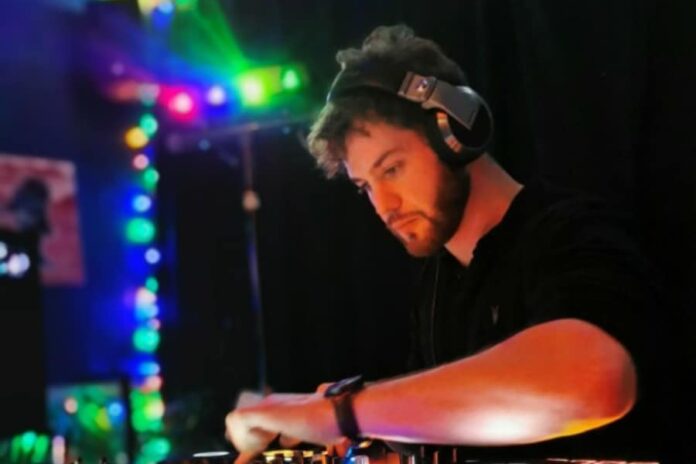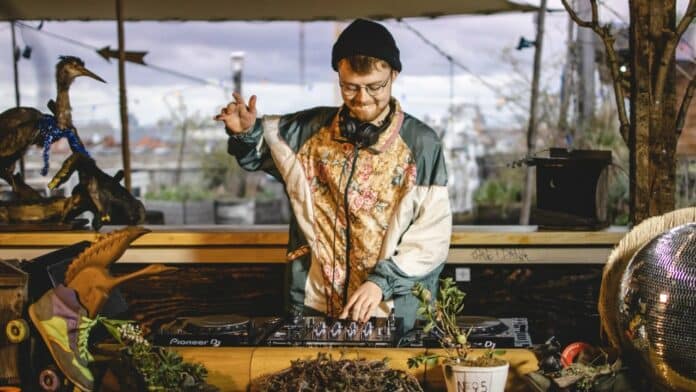
Wallflower: “We are a reaction to everything we don’t want to be – all the best music is”
Unlike everything else in the world right now, emo – popular music’s most misunderstood yet resolutely durable subculture – is looking pretty healthy in 2020. There’s the returning My Chemical Romance. There’s scene legends Fall Out Boy, currently scheduled to support Green Day on the giant question mark that is their world tour. And pressing pause on Paramore is Hayley Williams; then emo pop titan, now proper pop star and all the better for it. Beyond the big boys, there’s also a clutch of new bands at the younger end who comprise the genre’s next wave.
Look at Detroit’s hard-edged Dogleg or Las Vegas’ glam-pop dark lords Palaye Royale. There’s something in the water, and it’s probably tears. But there’s something happening here in Britain too. Alongside better-known names like Boston Manor, Creeper, Basement and Muncie Girls are London’s Wallflower. Soon they release their debut album ‘Teach Yourself To Swim’. It’s the sort of rock debut that doesn’t come around often enough; one made with more than a one colour palette, with songs that ache and roar.
From our new lives in lockdown, we catch up with the man behind said roar, singer and guitarist Vini Moreira-Yeoell, to talk about making music for quarantine, his greatest fear, and what ’emo’ really means.
Hey Vini. There’s no two ways about it. These are extraordinary times. How are you coping?
“I’m doing OK. For the first week of the lockdown I was unbelievably productive, making demos and working on some production stuff. Then at the end of that week I slowed down incredibly quickly. The second week has been a whole lot of nothing, just laying in my own filth, which is starting to take its toll a bit. There’s something really nice about doing nothing, but I need to be stimulated and interested in things, so…”
It would be said that Wallflower, on account of making such big, emotional and often very sad music, is perfect music for the era of COVID-19.
“It’s weird. We’ve sat on ‘Teach Yourself To Swim’ for so long and we really were planning this enormous campaign to promote it. Then just as we were about to do that… ‘Oh, there’s the biggest global pandemic of our lifetime’. There was talk of us postponing the release and just putting back our original plans, but I don’t think that’s right. People need music right now, more than ever. Thematically, the record we’ve made – which is largely about existentialism and feeling crazy in your own head – makes a lot of sense now.”
The record does create a feeling of release, which is essential during lockdown
“It’s interesting you say ‘release’, because that’s exactly the word I’ve been using to describe the writing and the recording of it. Without being too literal about the title, ‘Teach Yourself To Swim’ could be read as me teaching myself to just get on with life. To stop dwelling, to stop spending so much time focussed on things that have upset me or things that make me scared. Making the album was almost like self-help for me. A lot of the songs on the record are about coping mechanisms. Taking a step back and listening to it in the context of now, it does make a lot of sense in light of where the world finds itself.”
There’s also a sense of vulnerability to Wallflower’s music
“If I’m being honest with myself, playing in Wallflower has been the best opportunity I’ve ever had to really be open about myself and who I am. The topic of toxic masculinity is a conversation a lot of people are very rightfully having right now and it’s really great to see so much discourse about the subject and how it can be so harmful to so many. I’m really interested in the idea of self-improvement. We’re a band of five white, cisgendered men who in the grand scheme of things have a lot less to worry about than many when we walk out of our doors, let alone stand on a stage. That’s a privilege we shouldn’t ever take for granted.”
There’s a lyric in your single ‘Magnifier’: “There’s a fear of growing older / there’s a fear of what I’ve done. Fear of all the things I told her when I feared what I’d become”. What scares you, in relation to the band?
“I think the most terrifying thing would be to realise there is no enjoyment in it for me anymore. We took a little bit of time putting ‘Teach Yourself To Swim’ together, and there was a long period where we couldn’t play many shows. It felt like everything we did was admin and trying to work out how we were going to fund the next step of what we were doing. I’m a fairly anxious, pessimistic person so I’m always expecting things to go wrong, and that period really made me realise how much this band means to me.”
Emo is a musical term many cringe at, but it also means a lot to the people who like it. Are Wallflower an emo band?
“We’d like to think we were something to do with emo. We’d probably classify ourselves as an alt-rock band, but so many of our influences could be described as emo. I remember having NME’s ‘War On Emo issue’ [from 2006] when I was growing up, and I found that inspiring. I think that the best music is often a response to something that went prior. Look at Nirvana following hair metal, or different waves of emo following the popularity of quite macho rock scenes. I’m not saying that’s totally the case with Wallflower – and I’m not the kind of person who would throw shade at anyone – but there are a lot of very formulaic bands making music right now that do nothing for me. Wallflower are, in some ways, a reaction to everything that we don’t want to be…”
Wallflower release their debut album ‘Teach Yourself To Swim’ on June 5.





